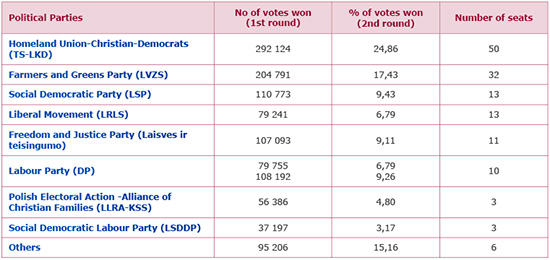Results
Elections in Europe
Corinne Deloy
-

Available versions :
EN

Corinne Deloy
The Homeland Union-Christian Democrats (TS-LKD), the main opposition party, led by Gabrielius Landsbergis and Ingrida Simonyte, consolidated its victory in the second round of parliamentary elections in 68 constituencies on 25 October. It won 50 of the 141 seats in the Seimas, the only house of parliament. The Farmers and Greens Party (LVZS), led by Ramunas Karbaukis and outgoing Prime Minister Saulius Skvernelis, won 32 seats.
Gintautas Paluckas' Social Democratic Party (LSP), which emerged as the main loser in the election, took 13 seats, as did Eugenijus Gentvilas' Liberal Movement (LRLS). The Freedom and Justice Party (Laisves ir teisingumo), a social-liberal party created in 2019, led by Ausrine Armonaite, managed to assert itself on the political scene with 11 elected members and is expected to enter the government after its first participation in an election. The Labour Party (DP), led by Viktor Ouspaskich, won 10 seats.
Finally, the partners of the Farmers' and Green Party in the outgoing government - the Social Democratic Labour Party (LSDDP) of Gediminas Kirkilas and the Polish Electoral Action - Alliance of Christian Families (LLRA-KSS) of Waldemar Tomaszewski and Rimantas Dagy - won 3 seats each.
Turnout in this second round, unlike the others (there were fewer meetings and debates than usual due to the measures taken to combat the coronavirus), was 39.7%, i.e. -7.82 points compared with the first round on 11 October.
Results of the general elections on 11 and 25 October 2020 in Lithuania
Turnout: 47.52% (1st round) and 39.70% (2nd round)

Source : Electoral Commission https://www.vrk.lt/en/2020-seimo/rezultatai
Ingrida Simonyte said she wants to form a coalition government with equal representation (the outgoing government comprised 1 woman and 13 men) based on an agreement in education and health, sectors she wants to reform. After the announcement of the results, she indicated that she would ally herself with the 2 liberal parties, the Liberal Movement and the Freedom and Justice Party.
The decline in confidence in the outgoing government was the sign of a desire for change (...) "We are determined to rally and form a coalition and a government under the leadership of Ingrida Simonyte. We will focus our efforts on restoring confidence between the State and the people," said the two parties and the Homeland Union-Christian Democrats in a joint statement.
The former Minister of Finance (2009-2012) stressed that she wished to accelerate the modernisation of the economy, to move from the current model of cheap labour to higher added value production. She wants to change the way the coronavirus health crisis is being managed. "We need to change the crisis management model because we lack transparency and clarity about who advises the government and who has the final say. We hear doctors and scientists saying that they are not listened to enough," she said.
"Voters were tired of the ruling coalition, they wanted a change in the political landscape," said Ramunas Vilpisauskas, professor of political science at Vilnius University. "Only minor adjustments are likely to be made in the European Union and in foreign policy, as there is a broad and strong consensus on the main guidelines among the country's political parties," stressed Kestutis Girnius, professor of political science at Vilnius University.
The outgoing government has not been thanked for the measures it has put in place to help the population cope with the economic crisis. Its policy and campaign promise to continue the fight against social inequality and to introduce an annual bonus, known as a 13th month of retirement pension, for the elderly failed to convince Lithuanians to renew their confidence in it. Outgoing Prime Minister Saulius Skvernelis was even defeated in his Vilnius constituency (Pilaite-Karoliniskes) by a Homeland Union-Christian Democrat candidate. Nevertheless, he retains his seat in the Seimas as he was elected according to the proportional list system.
Ingrida Simonyte is a 45-year-old economist from Vilnius. She once worked at the Ministry of Finance. In 2002 she was appointed Director of Taxes and two years later she was appointed Undersecretary of the Ministry of Finance.
In July 2009, Ms Simonyte was appointed Minister of Finance in the government led by Andrius Kubilius (TS-LKD). She remained in this position until the legislative elections of 14 and 28 October 2012, when the party was ousted from power. Following this defeat, she became deputy governor of the Central Bank before being elected deputy in the legislative elections of 9 and 23 October 2016. Ingrida Simonyte was a candidate in the last presidential elections of 12 and 26 May 2019. She won 33.47% of the votes in the 2nd round of voting, beaten by Gitanas Nauseda (66.53%).
The Homeland Union-Christian Democrats, a party of which she is not a member, but whose parliamentary group she had joined in the Seimas during the previous legislature, chose her to lead its list. A successful gamble for the party and for Ingrida Simonyte, who is expected to become the second woman Prime Minister in Lithuania after Kazimira Prunskiene, who led the country's first government after the Baltic Republic regained its independence in 1990.
On the same theme
To go further
Elections in Europe
Helen Levy
—
24 February 2026
Elections in Europe
Helen Levy
—
10 February 2026
Elections in Europe
Corinne Deloy
—
20 January 2026
Elections in Europe
Corinne Deloy
—
13 January 2026

The Letter
Schuman
European news of the week
Unique in its genre, with its 200,000 subscribers and its editions in 6 languages (French, English, German, Spanish, Polish and Ukrainian), it has brought to you, for 15 years, a summary of European news, more needed now than ever
Versions :


